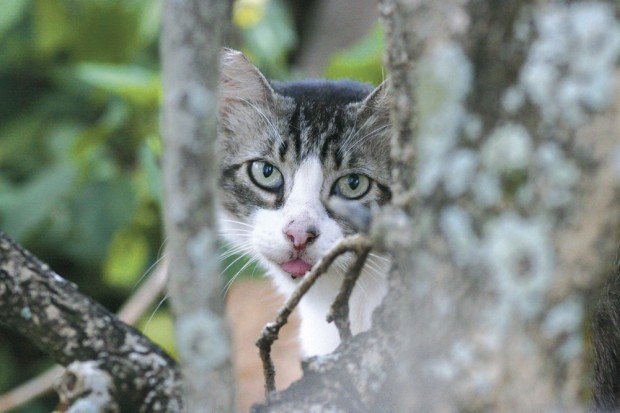LIHU‘E — While Kaua‘i Humane Society is offering a cat adoption special for the Month of May, it is also a busy time of year for their programs to deal with feral cats and a reminder to get pets microchipped.
LIHU‘E — While Kaua‘i Humane Society is offering a cat adoption special for the Month of May, it is also a busy time of year for their programs to deal with feral cats and a reminder to get pets microchipped.
Controlling Kaua‘i’s feral cat population requires attention to sensitive wildlife issues and an array of collaborations. Often times, cats they trap are merely domestic cats that have wandered astray from their homes.
KHS scans trapped cats for microchips that will help reunite lost cats with owners. KHS director Shannon Blizzard said cat owners should invest the $6 for a microchip that might save its life one day.
“If you do have an outside cat, then spay and neuter them but also insert microchip or collar with a tag as an indicator to people in community,” she said. “If it ends up at the shelter we will know right away if it is a companion pet that can be reunited with its family.”
The Kaua‘i Humane Society is also currently working with the nonprofit Kaua‘i Feral and other groups to effectively and humanely deal with the feral cat population. Island residents are encouraged to learn more about resources available to them.
Blizzard said the trap-and-release program is a way for residents to trap cats that present a problem. They bring the cats in to have them spayed or neutered, and when possible re-released in the same area without fear that caring for them will add to the undomesticated population. These cats are not suitable for adoption, because their wild instincts have already taken over.
“This will help address the population through attrition,” Blizzard said. “We are not trapping them for euthanasia. What we’re trying to do is focus on spaying and neutering.”
KHS will allows 48 hours to determine if a cat is feral or just a captured and fearful outdoor cat that was raised at some point by humans. They check for scars and other indicators to determine if it is wild or is a companion cat with the temperament to re-adapt as an adopted pet.
Kaua‘i Feral is a partnering organization that the KHS supports, Blizzard said. Together they offer outreach to caution residents that feeding feral cats that are not spayed or neutered is helping them to reproduce and increase the population.
KHS operates a summer mobile unit that performs spaying and neutering in the neighborhoods for people who can’t come to the shelter.
Feral kittens have a much higher chance of placement if they are captured before they reach two pounds or two months, Blizzard said. Once they reach six months, the wild instincts are set and there is little or no chance of adapting them to socialize with humans.
The Department of Land and Natural Resources brings in feral cats that are threatening birds and other protected wildlife. Blizzard said these cats are spayed and neutered but cannot be returned to the sensitive park areas.
“During its May cat adoption special, prospective families can visit the facility and interact with cats out of their cages to find the right matchfor just $5 instead of the normal $60 fee.
The cats are healthy, friendly, spayed or neutered, vaccinated and much preferable to taking in a stray, she said.
For more information call 632-0727 or visit kauaihumane.org and kauaiferals.org.


